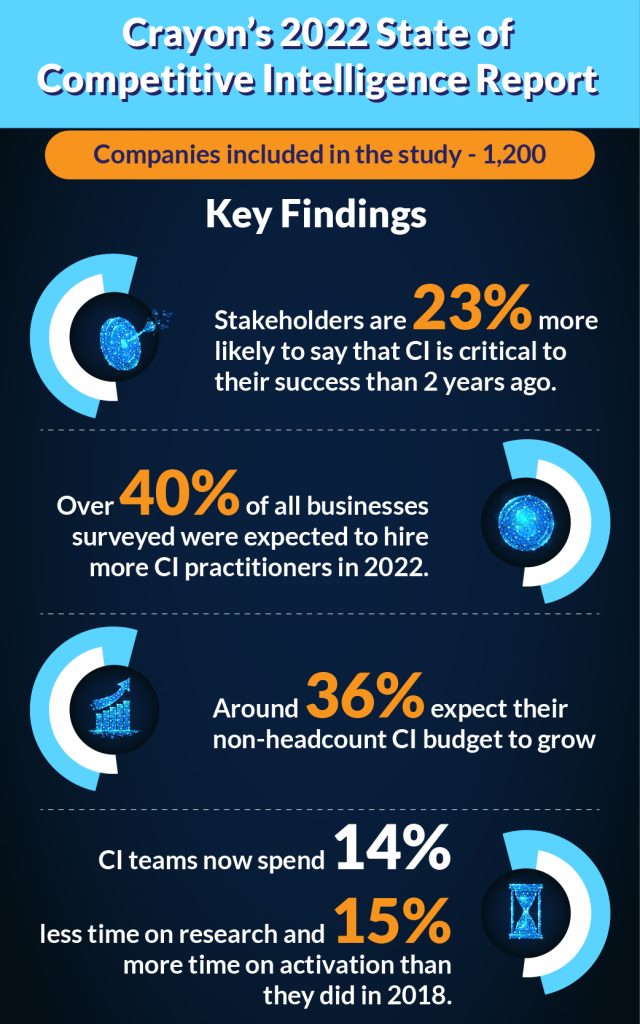Today, in order to remain as competitive as possible, it is important to know and understand what is unfolding in the world outside of your business. It entails knowing as much as you can, as soon as you can, about your market generally, your competitors, or even the specific zoning regulations in your area. In other words, it enables you to foresee obstacles and meet them head-on.
This is where competitive intelligence comes in. Competitive Intelligence (CI) is the gathering and analysis of data to foresee future competitive behavior, identify previous market upheavals, and objectively interpret occurrences.
It’s indeed a crucial part of creating a corporate strategy. Using known and unpublished sources, CI analysis offers insights into market trends and challenges in an organized, disciplined, and responsible and ethical manner.
You need strong competitor auditing capabilities and first-rate market information to find these new prospects. Tools for competitive intelligence can often aid in this situation.
Also Read: What Is The Best Marketing Strategy For Lead Conversions? Influencer Vs. Affiliate Marketing
Why is Competitive Intelligence Important to Marketers?
Understanding your consumers and their needs is made easier by competitive intelligence (CI). Additionally, keeping up with your rivals might very well enable you to make more informed strategic business decisions for your own business. You gain an advantage in your industry by actively and successfully keeping track of your rivals, which ensures that you always one step ahead.
Companies from many sectors and industries are establishing competitive intelligence departments to assist leaders in making sense of the chaos. In today’s increasingly competitive market, having CI practitioners committed to gathering, evaluating, and activating the correct data might mean the difference between stagnation and growth as we live in an era of information overload. Automation has emerged as a key instrument for attaining this objective. Companies have only recently started to harness the potential of CI to learn about competitors’ businesses and examine their tactics in the context of the market as a whole.
How is Competitive Intelligence Gathered?
To succeed, businesses must gain the trust of their customers and deliver exceptional customer service, and high-quality products. To know what to expect, this process requires gathering information about competitors and clients, which takes time and effort. CI is essential here as it enables businesses to gather and process the required data. This data can be collated from a variety of sources, including:
Syndicated Research Reports
These studies are critical to businesses since they include information on growth projections, business profiles, market-related statistics, and trends. These reports can help you get a general understanding of your market, your top competitors, and what makes them unique.
Competitor Website
The websites of competitors let you evaluate their goods and services, give you business insights, and share information about their developments. You can use a variety of tools to do a competitor analysis, such as SEMRush to track changes in your rivals’ rankings or Ahrefs to look up any URL’s top organic keywords and see how much traffic your competitor gets from them.
Marketing Tests
Particularly crucial are landing pages and A/B tests as they give you a glimpse into what your competitors are up to. You can determine what works best and what doesn’t need to be implemented by observing the advertising testing being conducted by your competitors.
Pricing And Packaging Updates
Marketing initiatives are also impacted by changes to packaging and pricing. Sharing them with internal teams, like sales, is crucial for this reason. These updates demonstrate changes in your competitor’s strategy, such as when they carry out commercial innovation.
Product Reviews
You can also examine product reviews written by real consumers. You can use this information to learn what aspects of your competitors’ goods and services customers enjoy and dislike. You will get crucial information about your rivals’ advantages and weaknesses in this manner. You can gain a competitive edge by recognizing your competitors’ shortcomings by learning what people think about their products.
Social Media Platforms
You may assess how customers feel about your items and the alternatives offered by your rivals by looking at customer comments on various social media platforms. Sincere criticism can aid in the improvement of your goods and services.
How Can Companies Strategize Using Competitive Intelligence?
Businesses spend a lot of time and energy determining the best course of action, but other factors also play a role. When scaling, knowing what customers want and what they aren’t getting from others might mean the difference between success and failure. CI offers this insight. Comprehensive CI programs aid businesses in understanding their environment.

Product development teams can use feature comparison data to determine their priorities and launch new services ahead of competition. The C-suite also has a significant role in CI. The larger context in which their operations take place and how their new products will fit in it are both important concepts for executive leaders to grasp. Executives can connect the dots and preserve the real-time perspective they need to make the best decisions possible by using CI solutions, which can offer the ideal balance of high level intelligence on a consistent level.
It is now time to start working on the segments discussed. You should be prepared to implement your competitive intelligence process if you’ve already chosen your competitive intelligence team, established your goals, made a plan, and fully comprehended your rivals.
When making sales battlecards, spend some time outlining the data that should be included. It is simple to actually carry out the strategy after obtaining competitive intelligence insights by developing planned and organized processes.
To Collate Everything..
Once your competitive intelligence process has been put in place, the key to making it truly successful is to make sure that every employee in your firm uses it. Feedback is crucial, so be sure to frequently inquire about the process’s strengths and weaknesses.
There’s a reason why CI is a top priority for so many businesses. At any point of a business’ existence, the data provided by a good CI program is valuable, but when trying to expand, the insights into market insufficiencies, customer satisfaction, and the overall market are priceless. Decision-makers in the market nowadays need to be also as well-prepared as they can be in order to comprehend the needs of their customers, their own skills, and how they fare in the competition.


Comments are closed.